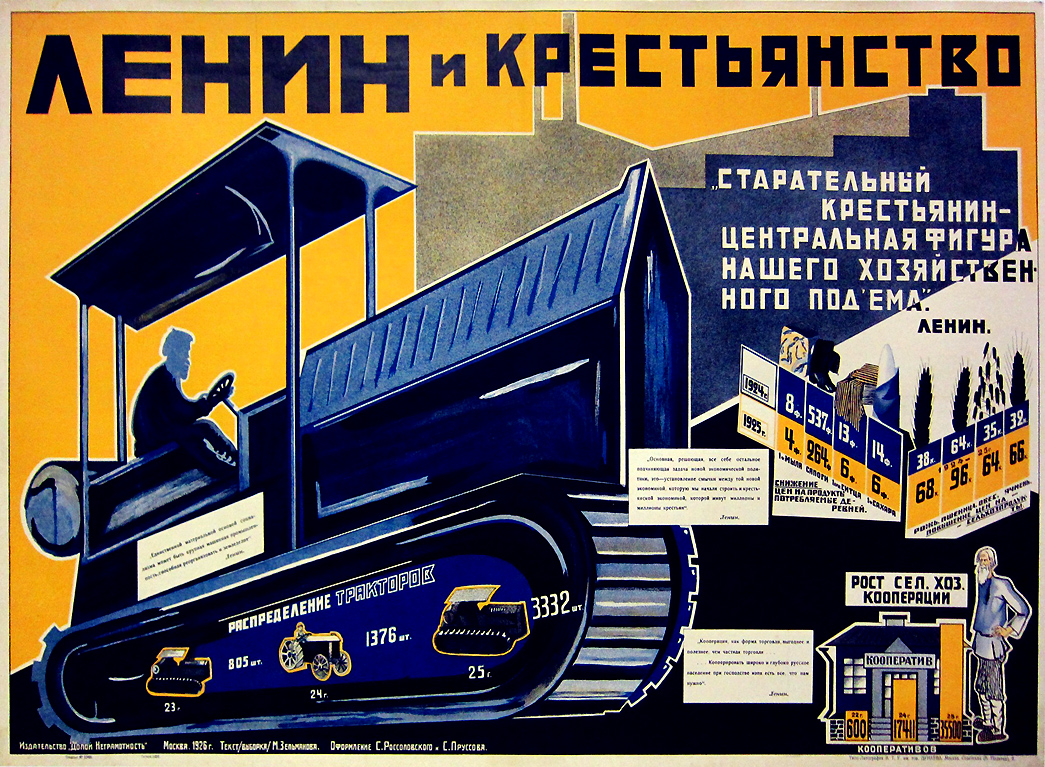
Lenin y el campesinado. “El campesino diligente es una figura central de nuestro desarrollo económico.” – Lenin [Traducción parcial]
Número de Cartel: PP 861
Información sobre el cartel: Poster was printed during the New Economic Policy (NEP) from 1921 to 1928, a period when limited free market economics were permitted in the Soviet Union.
Tamaño: Please inquire
Tipo de cartel: Litografía
Fecha de publicación: 1926
Editores: Text/selection: M. Zel’manov; Formatting S. Rossolovskii and S. Prussov
Ediciones: 5,000
Número de Glavlit: 53461
Fuentes: Baburina, N. I. (1988). Russkij plakat: vtoraa polovina XIX - nacalo XX veka. Leningrad: Hudoznik RSFSR; Russian S.F.S.R., Sokolov, A. K., & Borisova, L.V. (2000). Protokoly Prezidiuma Vysshego Soveta Narodnogo Khoziaistva. 1920: sbornik dokumentov. Moskva, Rosspen.
En el catologo: PP 861 Economy b
Artista: Artist Unknown — неизвестный художник
The artist's name on the poster is not indicated. By assigning Artist Unknown to a poster it also could mean the artist used a chop mark whereby no signature is seen thus rendering the artist's identity anonymous.
Leer más...
Imprenta: Typolithography of Geokartprom of the V.T.U. (Military Topographic Directorate of the Soviet Army), Moscow — Типо-Литография Геокартпрома В.Т.У. (Военно-топографическое управление), Москва
In 1918, the Soviets nationalized the Moscow printing works of brothers Wilhelm Theodor Mehnert and Herman Julius Mehnert at 9 Bol'shaia Polianka (later named Soviet Street). The building housing the printer was first occupied by the Julius Kirsten printing firm. Upon its nationalization, the Soviets placed Mehnert printing under Geokartprom, a State-owed trust of the Commissariat of Defense that centralized government-mapping projects. Geokartprom printed atlases and maps solely for military and government use. While it did map ...
Leer más...
Editorial: Narkompros (People’s Commissariat for Education) — Наркомпрос
The People's Commissariat for Education (Narkompros) was formed in 1918 and it encompassed the former Imperial Ministry of Public Education, the State Education Committee, and the former Palace Ministry (an entity that managed theaters, the Academy of Arts and the royal palaces). Overseeing Narkompros was the All-Russian Central Executive Committee (VTsIK). As the main educational branch of the government, Narkompros carried out a compliment of programs such as the combating of illiteracy, professional education, adult education, ...
Leer más...